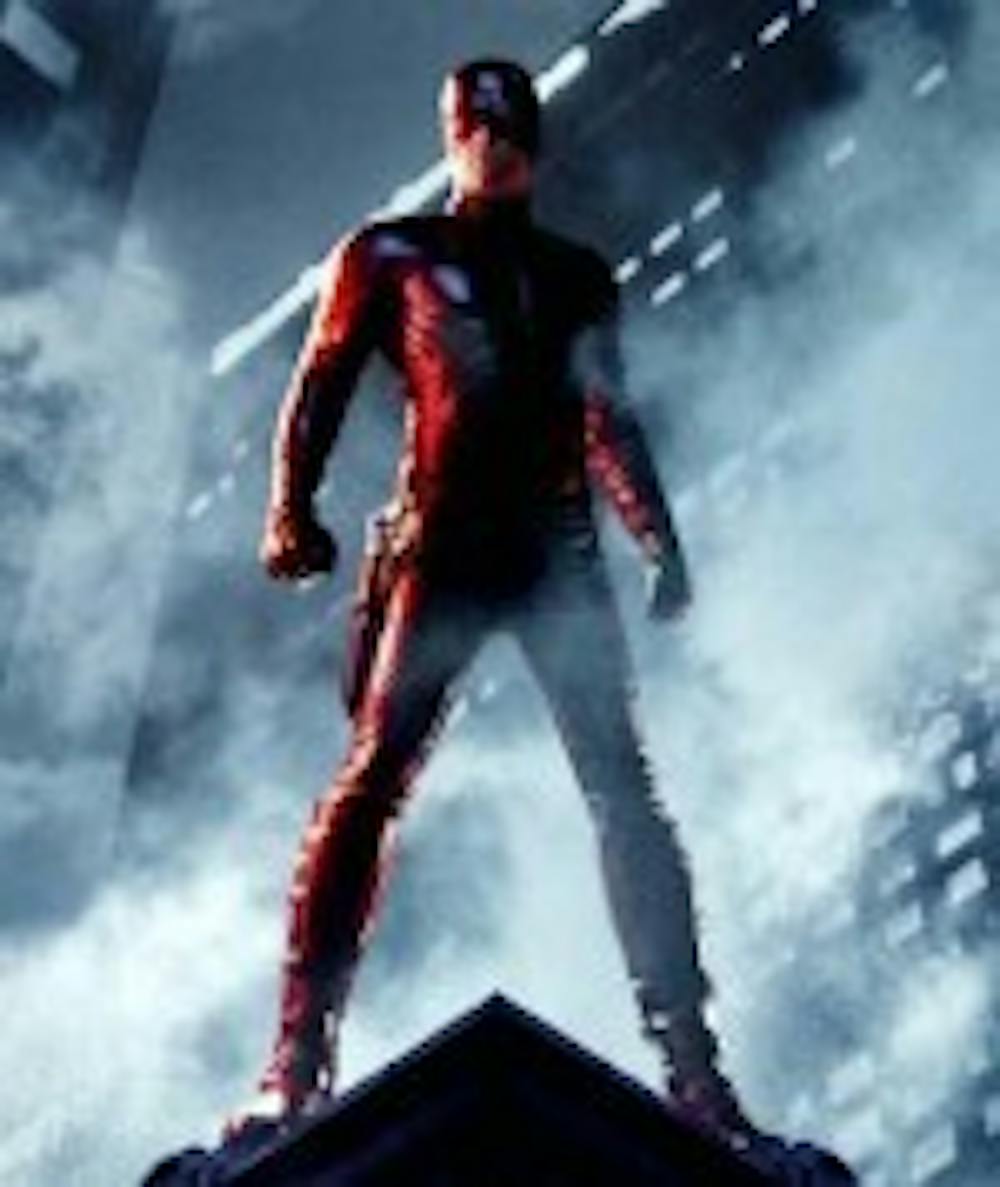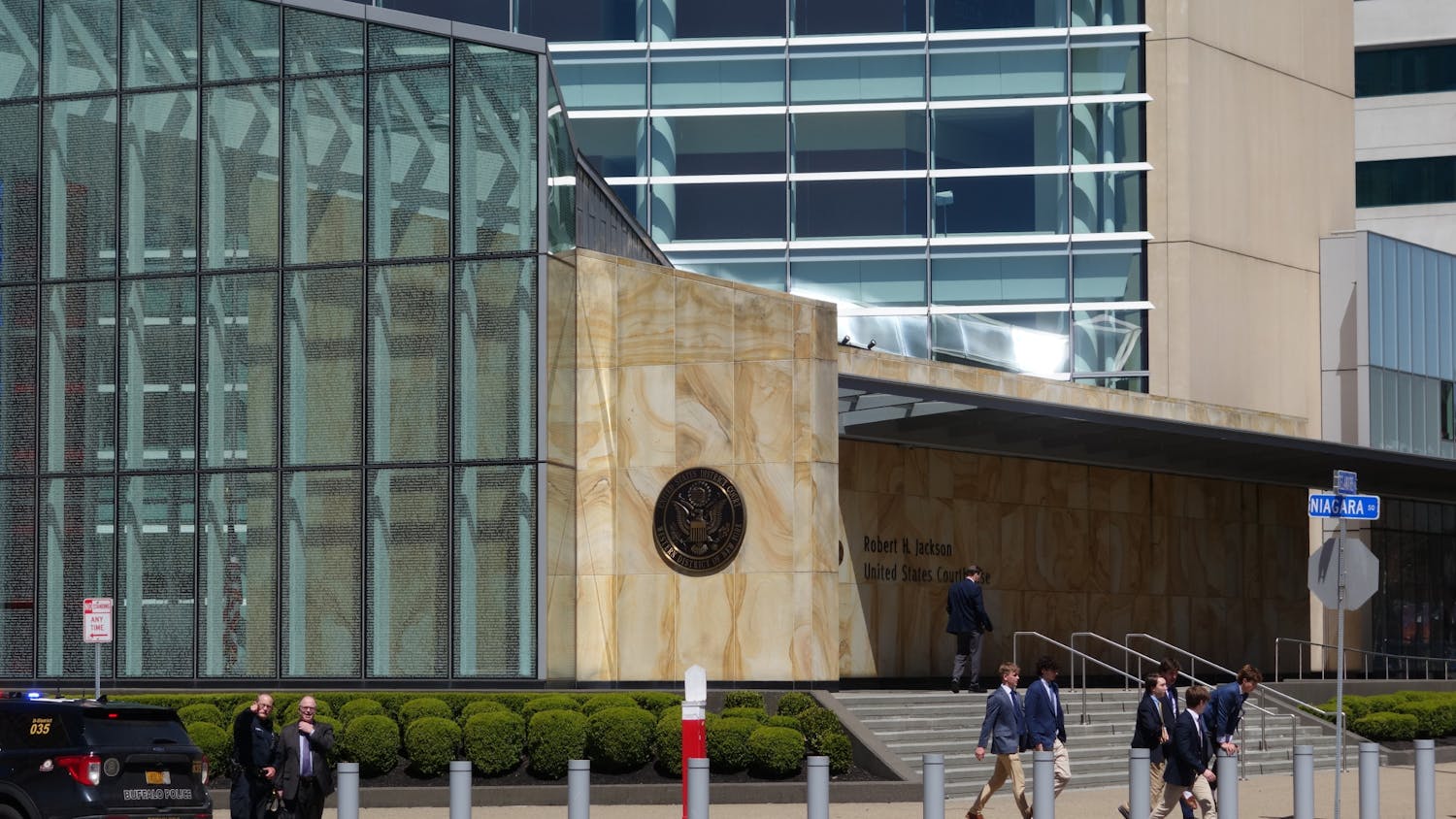Kingpin dents the ceiling of his office with the body of Daredevil. Daredevil shatters the stained glass of a cathedral with the body of Bullseye. Bullseye aims a knife at the body of Elektra. Elektra lunges a sai into the body of Daredevil.
Everyone is fighting each other. This is comic book paradise. From this angle, it's hard to see how "Daredevil" go wrong. However, punctuated between the multiple combat sequences, are remnants of a film that falls far short of its expectations.
But Lord knows everyone needs it. "Daredevil" will sucker-punch its way to the top of the box office next week because an action-hungry public, frozen under a winter full of cerebral, Oscar-flattering films, desperately needs to see something with summer movie flair. Face it: sometimes, thinking is overrated.
The problem is that this was not the intent of director Mark Steven Johnson. But he certainly takes the idea and runs with it - right into the dirty alleys of Hell's Kitchen, Daredevil's (Ben Affleck) home. He wants us to feel sorry for Stan Lee's comic hero, blinded by a car accident involving radioactive waste, but empowered by its mysterious effects on all his other senses, especially sound. Distraught over the murder of his father, Daredevil is a slave to justice, exacting it by day in the courtroom as attorney Matt Murdock and distributing it vigilantly with his fists at night.
He lets you know this with witty insights like, "Ladies and gentleman. Justice is blind but it can be heard." Get it?
"Daredevil" is the kind of film that reminds viewers that the villainous henchman's name is Bullseye - Colin Farrell in a scene-stealing role. He's called Bullseye because he has a bull's eye imprinted on his forehead and in his opening scene, shoots darts into the bull's eye - just in case you forget. And he does it while a House of Pain song is played in the background.
Or take another moment when, just before he is wiped across a barroom floor, one bad guy asks Daredevil, "What do you want?
"Justice," our hero replies.
Apologists would contend that "Daredevil" is supposed to be a mere action film, but it's debatable if that absolves it from the sheer corniness that pervades the script. Some action films like "Half Past Dead," and "Collateral Damage," can get away with this, but after the success of great comic book films like "X-Men" and "Spider-Man," the bar has been raised high - too high for "Daredevil."
On the other hand, the immense draw of "Daredevil" is not its script; God knows it is from watching Ben Affleck and Jennifer Garner (as his highly kinetic love interest Elektra Natchios) perform their best Bruce Lee imitations in leather outfits.
These are the finest moments of the film, but it takes an awfully long time to get there. For an entire hour, Daredevil mopes about, brooding over a dark city with a stiff upper lip and fighting thugs much too weak to be entertaining. He exchanges a few witty barbs about sewer alligators with his law partner, Foggy (Jon Favreau), but that is basically it.
Although Stan Lee created the original "Daredevil" comics, it is clear that Johnson is more influenced by Frank Miller's dark interpretation when he penned the stories in the 1980s. It borrows loosely from a story involving Murdock's infatuation with Elektra and her climatic fight with Bullseye. Added into the mix is head villain Kingpin (Michael Clarke Duncan), the untouchable crime boss of Hell's Kitchen that tries to murder the noncompliant Natchios family. In terms of physique and attitude, Duncan is the definitive Kingpin. Too bad you barely see him in the movie.
But darkness doesn't automatically translate into insight or entertainment. Except in one amusing instance when Murdock returns home, beat after a night of crime-fighting, to hear a message from his soon-to-be-ex -girlfriend: "Matt, it's Heather. Are you there? Of course not, you're never there ... I mean Jesus, where do you go at three o'clock in the morning?"
Comic book heroes are appealing not only because of their abilities, but their vulnerabilities - the emotional frailties that make them outcasts in the everyday world. Spider-Man was picked on in high school and Rogue couldn't kiss a boy without putting him in a coma. But the script in "Daredevil" is so insipid and the plot execution so by-the-book that Murdock can get abused by bullies, go blind and lose a father. But the viewer still doesn't care.
This leaves the actors to their own devices. Although many have expressed doubt about Affleck's ability to transform himself into a superhero, he does a decent, if passable job. Dating J.Lo probably taught him something about superhuman strength.
As his romantic counterpart, martial arts expert Elektra, Garner matches the tough persona of Stan Lee's comic assassin, although she's a good girl in the movie. The relationship between the two is understandably quick and heated, taking into the account dynamic personalities of both characters.
One of the best moments in "Daredevil" involves a striking portrayal of how Murdock "sees" Elektra before they first kiss in the rain. Though blind, Murdock can visually perceive the presence of objects around him through a process similar to sonar. The filmmakers refer to this as the "shadow world," a blue, luminescent radar that allows Daredevil to sense his enemies or kiss his friends in absolute clarity when it rains.
This drama between the two leads vastly improves the movement of the story in the second half of the film - especially when all four major characters express their frustration with violence. It's not too little too late.
But it makes the experience of "Daredevil" lukewarm at best. No one remembers Tim Burton's "Batman" for the fight sequences, but for the psychotic role of Jack "The Joker" Nicholson screaming, "This town needs an enema!" "Spider-Man" could not have earned top box office honors by web-swinging alone.
But when the fists stop flying in "Daredevil," the film has little left to hold it together.





